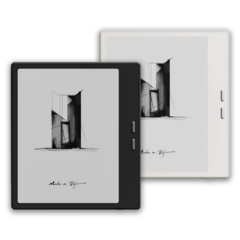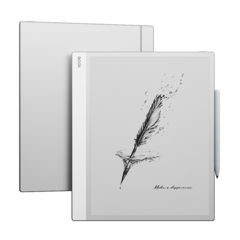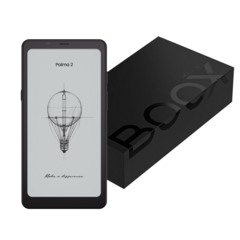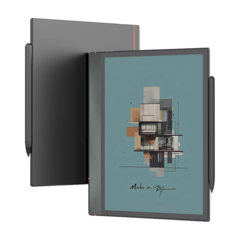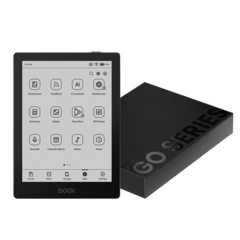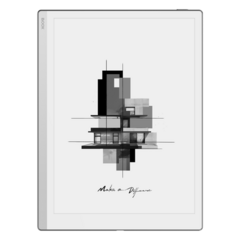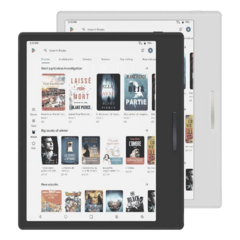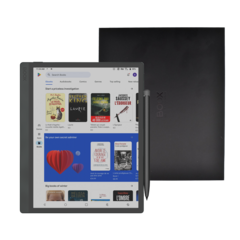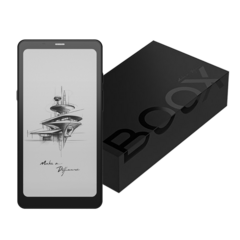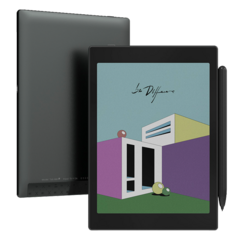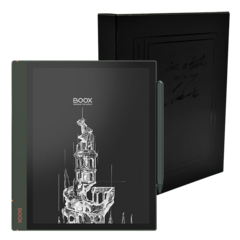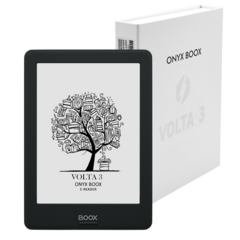Onyx Boox Note Air 2
- Source: pcmag.com
- Author: Sascha Segan , 11.17.2021
- All rights reserved
-
Pros
- Top-notch build quality
- Built-in reading and note-taking apps work well
- Good battery life
-
Cons
- Taking notes in third-party apps isn't great
- App compatibility can be hit or miss
- Not wateproof
Most E Ink readers available in the US are 6- or 7-inch models because those are the appropriate sizes for one-handed reading of most books. However, people who read large-format documents or frequently take notes might prefer a tablet with more screen real estate, such as the $499.99 Onyx Boox Note Air 2. The Note Air 2 takes the reins from its excellent predecessor as the most capable and physically delightful E Ink tablet in its size range. The device also isn�t tied to any one format or ecosystem, either�it can run any Android reading app. We ran into some inconsistencies with its note-taking experience and wish it was waterproof, but those issues don't prevent the Note Air 2 from being worthy of our Editors� Choice award.
Cool and Classy
In a mostly plastic E Ink landscape, the Note Air 2's metal frame stands out. At 9.1 by 7.7 by 0.2 inches (HWD) and 14.8 ounces, it's the same size and weight as last year's model. It balances decently well in one hand, but is a bit too heavy to hold like that for extended periods. The tablet is smooth and cool, with a flat front and a grip area to the left of the 10.3-inch, 1,872-by-1,404-pixel screen. The included pen doesn't require charging and attaches magnetically to the right side of the tablet. The magnetic grip isn't that strong, however, so it's pretty easy to knock the pen loose. Unfortunately, the tablet isn't waterproof.
The Note Air 2 uses an E Ink Carta HD screen, not the newer E Ink Carta 1200 panel that the Kobo Elipsa uses. Compared side by side, the Elipsa turns pages slightly more quickly and its front light is slightly bluer and brighter. On the other hand, the Note Air 2 has a color-changing light that goes from blue to yellow. Both tablets sport the same resolution, with 226 pixels per inch.

Unlike Kindles, the Note Air 2 has a speaker and a microphone. The tablet lacks a headphone jack�the whole thing is slimmer than a 3.5mm plug�but you can connect Bluetooth headphones to it. A power button and a USB-C port round out the exterior features. It connects to the internet using dual-band Wi-Fi.
The Note Air 2's plastic active stylus is cylindrical; one side is flat and magnetized (for attaching to the tablet), while textured lines to help with grip. There are no buttons on the body. A replacement pen costs $45.99 and a pack of five tips costs $20.99.
Ideal for Reading
Onyx devices are a paradise for tweakers. They feature color and brightness sliders for the front light; darkness and contrast sliders for image rendering; and four different refresh rate options. This flexibility is useful if you read different kinds of PDFs. For example, a color document may benefit from higher contrast, while a scanned black-and-white one could use less sharpening. Onyx's reading app, NeoReader, is another advantage. The app supports in-document annotations, PDF tables of contents, and even OCR for PDF documents. The Note Air 2 loaded every document I tried (even PDFs and CBR graphic novels that are hundreds of pages long) within a few seconds and flipped through pages smoothly.
Yet another strength of the Onyx platform is that you can read in whatever app you prefer, including the Kindle app. The tablet can even simultaneously read Audible books out loud to you and show you their text, something regular Kindles can't do (especially because they don't have speakers). Oddly, the Note Air 2 doesn't highlight individual words as it reads them, something Kindle's Immersion Reading feature is supposed to do.
In terms of reading comfort, the Note Air 2's E Ink panel is simple and restful, regardless of the backlight color you prefer. A new screen coating increases glare just a bit, but not too badly.

Android, With Quirks
The Note Air 2 runs Android 11 on a Qualcomm Snapdragon 662 processor, up from a 636 on last year's unit. Its 4GB of RAM and 64GB of storage are an improvement, too; its predecessor had 3GB of RAM and 32GB of storage. Onyx is better than other E Ink slate makers at delivering tablets with relatively up-to-date versions of Android, although with all of these gadgets, I never assume they'll get updates beyond their initial major version.
E Ink tablets can't pass Google Play certification because they automatically fail a mandatory video frame rate test. That said, Google turns a very mellow blind eye to Onyx's workaround that lets you easily install Google Play. You can tap some options deep in the settings, and in my experience, finalize it by logging into Gmail via the browser.
If you don't want to use Google Play, the Note Air offers a tiny, curated app store of fifty or so key apps taken from APKPure. But I say don't bother messing with that app store; use the legal, current versions of the apps on Google Play.
App compatibility is hit or miss, as always with Onyx tablets. Kindle, Kobo, Libby, Marvel Unlimited, Nook, The New York Times, and web pages all look great on the screen. However, the VIZ manga app zoomed weirdly and I couldn't see whole pages. Notion, a note-taking app, couldn't authenticate with Google, either.

Onyx gives you various refresh rate settings that either keep text sharp or make the screen fluid enough for YouTube videos at the cost of ghosting. I've even played games on these tablets, despite some weirdness. Performance isn't the sprightliest; the Note Air 2 doesn't feel as fast as an iPad, but performs acceptably.
Battery life on E Ink tablets is difficult to quantify. Our typical video rundown test isn't a good metric, because that's not the main use for this device. Anecdotally, after four days' worth of light testing with some reading, sketching, and taking notes, the 3,000mAh Note Air 2 still had 58% of its battery left. Thus, it will probably last about a week with light use or around half that with heavy use. Your backlight level will affect battery life, too.
Take Note
The Note Air 2 has a new film over the screen that gives it a more paper-like feel than the original model. This makes an appreciable difference, and the pen grips nicely on the screen. It feels more textured, less slippery, and more tactile than the Apple Pencil on an iPad screen or an S Pen on a Galaxy S21 screen. That said, the Kobo Elipsa and Remarkable 2 offer a similar experience.
For taking notes, Onyx's Notes app is excellent. You can write or draw in 12 shades of gray and three colors; add scribbles and audio recordings; output to PNG or PDF; and upload your creations to your favorite cloud storage service. I noticed a slight delay sometimes when starting a new line, but the pen kept up with my fast writing pace.

You can draw on PDFs in the built-in reader app (helpful for when you need to sign documents) as well as switch to a split-screen mode that lets you read or annotate a document on one side and take notes on the other. In that split-screen mode, you need to be patient; I noticed a second or so of delay when switching between the two sides.
Usable ink speed is largely restricted to Onyx's built-in Notes app, although Onyx has been trying to optimize the experience for other apps. One problem with third-party apps is that the tablet has to cache a bunch of strokes and then send them to the app periodically; this results in weird pauses as a line renders. In OneNote, I could write only slightly less than a line at a time before the Note Air 2 paused for a second to render the strokes. During that interruption, I couldn't see my new strokes on the screen. The app caught up eventually, but the experience is still a little disconcerting. I spoke to Onyx about this issue and I'm confident it is going to fix this lag with a software update that extends the buffer.
In Evernote, another officially supported app, I didn't see those pauses, but sometimes the pen would drop strokes. Inkredible and Autodesk Sketchbook, which aren't officially supported, had unacceptable levels of ink lag.
E Ink drawing can require a bit of an adjustment. I asked an artist I know to sketch with the Note Air for the afternoon and they found that, compared with drawing on an iPad, the pressure-sensitive brushes on the Note Air get too easily gloppy (it's too hard to control the line width). They also noticed lag. These drawbacks are true of all E Ink slates.

A More Versatile Ebook Reader
If you find that the typical ebook reader is too small for reading and annotating court decisions, academic papers, or general-purpose PDFs, the Onyx Boox Note Air 2 might be just the right size for your needs. Its open Android OS and support for the Google Play Store enable you to read documents from anywhere, as well as upload them to your cloud storage provider of choice. The Air 2 isn't a huge upgrade over its predecessor, but because the original model won't likely stay on sale for much longer, the Note Air 2 is our clear Editors' Choice winner for 10-inch ebook readers and E Ink tablets.
If you're in the market for a smaller ebook reader, the $139.99 Kindle Paperwhite is our Editors' Choice for Amazon's platform. The $179.99 Kobo Libra 2 is another top pick because it supports more formats than competing Kindle models. And if you need something even larger than the Note Air 2, consider the $879.99 Onyx Boox Max Lumi 2, which has a 13.3-inch screen.

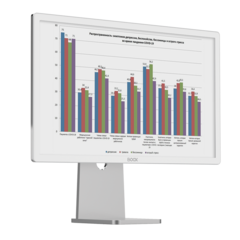

_announce_600x600-240x240.png)
